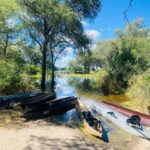The Ministry of Lands and Water Affairs in Botswana, through its Department of Town and Country Planning, has made a landmark decision by declaring all districts in the country as Planning Areas. This declaration is in accordance with the Town and Country Planning Act of 2013 and the Botswana Land Policy of 2015, aiming to create a structured framework for land use and resource management. This strategic move is poised to significantly influence land development practices across the nation, promoting orderly growth while balancing the need for environmental sustainability.
A Framework for Orderly Land Development
The declaration of all districts as Planning Areas is a critical step in fostering orderly and progressive land development. By establishing clear planning parameters, the government aims to streamline land use, ensuring that development occurs in a systematic and organized manner. This approach includes several key changes:
- Preparation of Development Plans: The declaration mandates the formulation of comprehensive development plans for settlements. These plans will guide future growth, ensuring that infrastructure, housing, and public services are developed in alignment with community needs and environmental considerations.
- Mandatory Planning Permissions: Various types of developments will now require mandatory planning permissions. This measure ensures that all construction and land-use changes adhere to the established guidelines, promoting responsible development practices and minimizing potential conflicts between different land uses.
- Area-Specific Development Guidelines: The creation of area-specific guidelines will help tailor land use to the unique characteristics and needs of each district. This localized approach allows for more effective resource management, taking into account local ecosystems, cultural heritage, and economic activities.
- Relaxation of Planning Standards: In certain areas, there may be a relaxation of planning standards to accommodate specific local needs. This flexibility can encourage development in underutilized regions while still maintaining a commitment to sustainable practices.
Balancing Development and Environmental Sustainability
While the declaration aims to promote growth, it also raises important questions about how to balance development with environmental sustainability. Botswana is home to diverse ecosystems and natural resources, making it essential to consider the environmental impact of land-use changes.
- Sustainable Land Use Practices: The establishment of development plans and guidelines provides an opportunity to incorporate sustainable land use practices. By prioritizing green spaces, protecting natural habitats, and promoting eco-friendly construction methods, the government can mitigate adverse environmental effects.
- Community Involvement: Engaging local communities in the planning process can enhance the sustainability of development initiatives. Community input ensures that projects reflect the needs and values of residents while fostering a sense of ownership and responsibility towards the local environment.
- Monitoring and Enforcement: Effective monitoring and enforcement of planning permissions and guidelines are crucial to achieving sustainable outcomes. The government must ensure compliance with regulations to prevent overdevelopment and environmental degradation, particularly in sensitive areas.
- Education and Awareness: Raising awareness about the importance of sustainable development practices among developers, local authorities, and communities can promote a culture of environmental stewardship. Educational initiatives can empower stakeholders to make informed decisions that align with sustainable land use goals.
The declaration of all districts in Botswana as Planning Areas represents a significant advancement in the country’s approach to land management and development. By establishing a structured framework for land use, the government is poised to facilitate orderly growth while addressing the pressing need for environmental sustainability. Balancing development with environmental considerations will be crucial in ensuring that Botswana’s natural resources are preserved for future generations. Through careful planning, community engagement, and sustainable practices, Botswana can achieve a harmonious balance between growth and environmental stewardship, paving the way for a prosperous and sustainable future.










